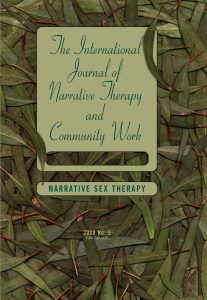 Dear Reader,
Dear Reader,
Spring has arrived in Australia and we’re pleased to be able to bring you this issue of the International Journal of Narrative Therapy and Community Work.
It features what we think will be an influential paper by Yael Gershoni, Saviona Cramer and Tali Gogol-Ostrowsky entitled: ‘Addressing sex in narrative therapy: Talking with heterosexual couples about sex, bodies, and relationships’. The topic of sex therapy has been sorely neglected within the field of narrative practice and we suspect that this paper will spark considerable interest in creative, respectful and effective forms of narrative sex therapy. In future issues we wish to publish further papers on this topic. So, if you have therapeutic conversations about sex we would be very interested to hear your feedback on the paper by Yael, Saviona and Tali. We’d also be interested in receiving papers or reflections about the ways you use narrative ideas in talking about sex. Thanks!
The first section of this journal issue also includes a paper titled: Using the ‘failure conversations map’ with couples experiencing fertility problems. We hope this will be helpful to practitioners who are working in this realm.
The second section of the journal focuses on a key aspect of narrative practice: an ethic of circulation. This relates to ways in which therapists and community workers can document and circulate the skills and knowledges that people are using to address difficulties in their lives. Three papers are included here. The first, by David Newman, introduces the concept of ‘living narrative documents’. The second, by Ross Hernandez, shares ideas about ways of using voice recordings to facilitate ‘long-distance’ definitional ceremonies. And the third, by Sarah Lunn, describes work with children who are living with Sickle Cell Disease.
The third section of the journal includes two thoughtful papers which explore how research can influence practice. One of these relates to the meanings of sexualised coercion and gender in psychosocial group sessions for women. The other undertakes conversational analysis of externalising conversations.
As you can tell, this is a diverse journal issue! It includes papers from Canada, Israel, Australia, Denmark and England. There are so many interesting developments in narrative practice at this time. As always, we’d like to acknowledge both the authors and the readers/subscribers of the International Journal of Narrative Therapy and Community Work.
Warm regards,
Cheryl White

 Dear Reader,
Dear Reader,